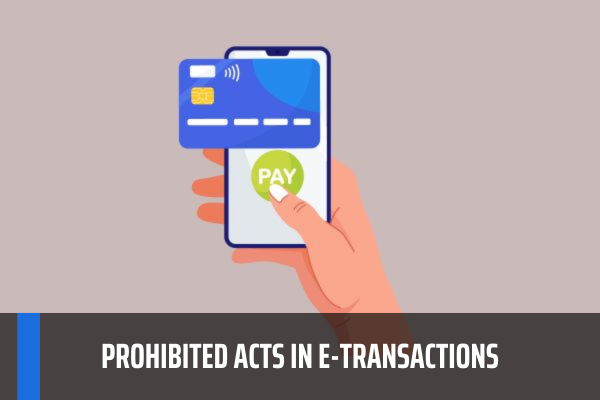What are the prohibited acts in e-transactions in Vietnam according to the Law on Electronic Transactions 2023?
What are the prohibited acts in e-transactions in Vietnam according to the Law on Electronic Transactions 2023?
According to Article 6 of the Law on Electronic Transactions 2023, the prohibited acts in e-transactions include the following:
(1) Taking advantage of e-transactions to commit offences against the national interests, national security, social order and safety, public interests, legal rights and interests of agencies, organizations and individuals.
(2) Illegally obstructing or preventing the process of generating, sending, receiving and storing data messages or committing other acts to destroy information systems serving e-transactions.
(3) Illegally collecting, providing, using, disclosing, displaying, spreading, trading data messages.
(4) Counterfeiting, falsifying, or illegally deleting, canceling, copying, moving the part or whole of a data message.
(5) Creating data messages in order to commit illegal acts.
(6) Cheating, counterfeiting, appropriating or illegally using e-transaction accounts, electronic certificates, electronic signature certificates, and electronic signatures.
(7) Obstructing the selection of carrying out e-transactions.
(8) Committing other prohibited acts in accordance with regulations of law.

What are the prohibited acts in e-transactions in Vietnam according to the Law on Electronic Transactions 2023?
What are the e-transaction development policies in Vietnam?
In accordance with Article 4 of the Law on Electronic Transactions 2023,in e-transaction development, the State has the following policies:
- Protect the interests of the State, interests of the community, legal rights and interests of agencies, organizations and individuals.
- Ensure that the selection of e-transactions is voluntary; and the parties agree on which types of technology, electronic means, electronic signatures, other forms of authentication by electronic means will be used to conduct e-transactions, unless otherwise provided for by law.
- Develop e-transactions in all aspects to ensure completion of all stages of the procedure by electronic means and promote digital transformation; optimize the procedure, thereby shortening time for processing and being more convenient in comparison with other transaction methods.
- Synchronously apply regulations and measures to encourage, give incentives and facilitate the development of e-transactions; take priority over investment in developing technology infrastructure, developing and applying new technologies, training human resources for e-transactions, especially in mountainous areas, border areas, islands, ethnic minority areas, areas with difficult socio-economic conditions and areas with extremely difficult socio-economic conditions.
What are the responsibilities of administrators of information systems serving e-transactions in Vietnam?
Pursuant to Article 47 of the Law on Electronic Transactions 2023, it is stipulated as follows:
Responsibilities of administrators of information systems serving e-transactions
1. Administrators of information systems serving e-transactions shall be responsible for:
a) Complying with the regulations of this Law and laws on information security, cybersecurity, personal information protection, personal data protection and other relevant laws;
b) Providing information by electronic means in accordance with law in service of measurement, statistics, supervision, inspection, examination and reporting at the request of state management agencies in charge of e-transactions; sharing data in service of state management of e-transactions;
c) Supervising the security of information systems serving their e-transactions in accordance with the law on information security.
2. Administrators of large digital platforms serving electronic transactions shall be responsible for:
a) Complying with regulations in clause 1 of this Article;
b) Publicly disclosing and disseminating mechanisms for reporting and handling problems arising in e-transactions;
c) Publicly disclosing and disseminating mechanisms for reporting and handling contents that violate Vietnamese law on digital platforms from reliable feedbacks;
d) Annually making reports, under the guidance of the Ministry of Information and Communications, on incidents that have occurred or incidents that have signs or risks of abusing information systems to commit acts of violating Vietnamese law.
3. Administrators of very large digital platforms serving e-transactions shall be responsible for:
a) Complying with regulations in clause 2 of this Article.
b) Publicly disclosing general principles, parameters or criteria used to make recommendations on displaying contents, advertisements to users and allowing users to choose not to use such recommendations based on analysis of data on users;
c) Allow users to uninstall any pre-installed applications without affecting basic technical features for normal operation of their platforms;
d) Publicly disclosing and disseminating codes of conduct applicable to users of their platforms.
4. The Government shall elaborate responsibilities of the administrators of intermediary digital platforms in Clauses 2 and 3 of this Article in accordance with scales, numbers of users in Vietnam or numbers of visits from users in Vietnam.
Thus, the responsibilities of administrators of information systems serving e-transactions are implemented according to the above regulations.
The Law on Electronic Transactions 2023 takes effect from July 1, 2024.
LawNet

